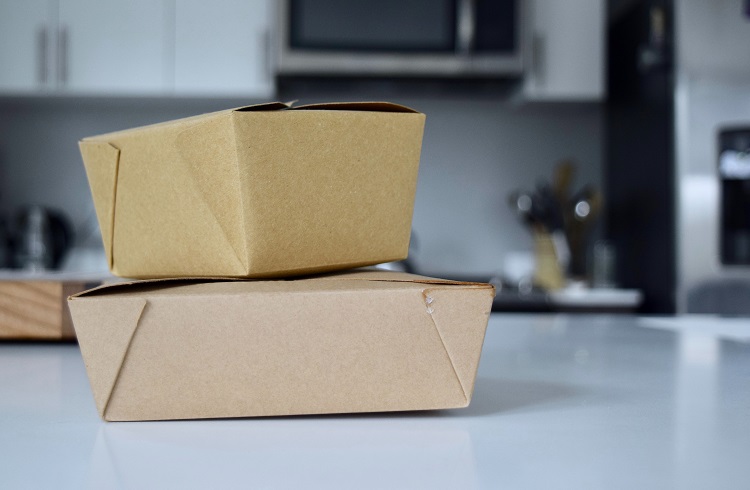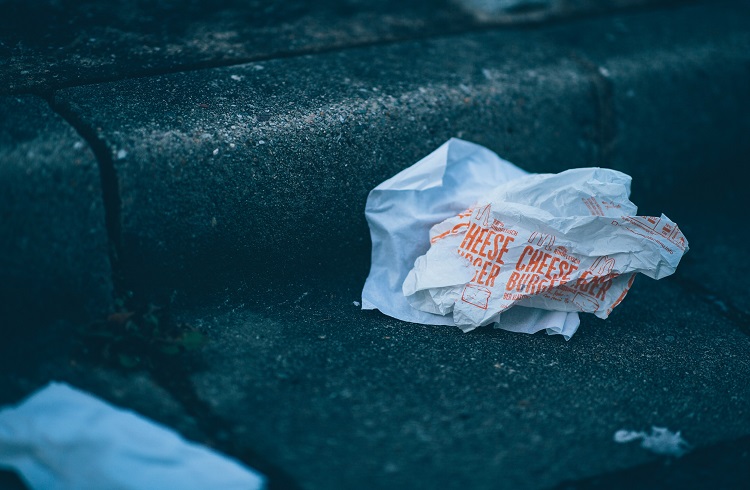Update: Victory! California Governor Newsom signed the BCPP co-sponsored California Safer Food Packaging and Cookware Act (CA AB1200) into law October 5, 2021. Thank you for all your support!
By BCPP Senior Policy Advocate, Lisette van Vliet
In our busy lives, food on the go is a regular feature, whether it’s takeout or home deliveries, eating at the food truck, or grabbing a bite at the local café. While you may have thought about the health of that food in terms of nutritional content, or the volume of trash generated from that meal, there’s something else you may not have heard much about: the toxic chemicals leaching from the packaging into your food and posing risks to your health.
When it comes to paper-based packaging or cardboard style containers, this natural-fiber derived food packaging often comes coated with a layer of non-stick chemicals called per- and polyfluoroalkyl substances, better known as PFAS or Forever Chemicals.

These toxic PFAS chemicals are known as “forever chemicals” because they do not break down when exposed to the elements – sun, rain, wind, heat, soil. They are often used in materials that contact food to confer grease and water resistance. Who wants a French fry packet to turn into a soggy pulp and stick to your fries and your fingers, right?
The problem is that the PFAS in the paper wraps, bags, sleeves, liners, plates, bowls, trays, molded fiber clamshells and even straws move out from the packaging into the food and ultimately into us. Luckily, alternatives are already available that allow us to avoid both the pulp and poison.
PFAS are linked to serious health problems. On the list are breast cancer and other cancers, birth defects, hormone disruption, kidney and liver damage, and thyroid disease. Scientific research has also linked PFAS exposure to immune system impairment, including decreased antibody response to vaccines. During a worldwide pandemic, that constitutes some very concerning news.
Moreover, it’s not just when it leaches into food that this PFAS-laden packaging poses a problem for our health. Workers are exposed to PFAS in the facilities that make the packaging, compost made with the packaging can contaminate our agricultural soils with PFAS, and the litter that washes into waterways can contaminate our drinking water.

While ultimately the problem of PFAS should be handled at federal level, states are acting because the FDA has not done its job. While the FDA has banned a handful of the worst PFAS, the scientific consensus is that we must ban the entire class of over 9000 chemicals to protect our health and the environment. So long as the FDA is not moving to regulate the whole class of PFAS chemicals, states need to, and will continue to, take the lead in protecting our health.
The California legislature has passed a bill to ban these chemicals in paper-based food packaging, following on the heels of other states like New York, Connecticut, Minnesota and Vermont. The California Safer Food Packaging and Cookware Act (CA AB1200) is on Governor Newsom’s desk for signing as of September 21, 2021.
The danger to our health is too serious to ignore. If AB1200 becomes law in California, we will more than double the number of people living in states banning PFAS in paper food packaging; that could be a game-changer for packaging manufacturers, pushing them to get all of us to a safer packaging future much sooner.
And that means better prevention of breast cancer and other diseases, for everyone.
Get Chemicals Linked to Breast Cancer Out of our Stuff!
Help reduce and eliminate our exposure to chemicals linked to breast cancer through our action center.

